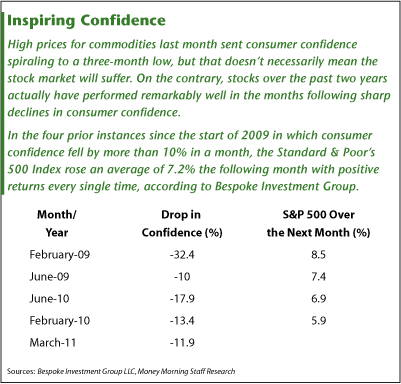High prices for commodities last month sent consumer confidence spiraling to a three-month low, but that doesn't necessarily mean the stock market will suffer.
On the contrary, stocks over the past two years actually have performed remarkably well in the months following sharp declines in consumer confidence.
In the four prior instances since the start of 2009 in which consumer confidence fell by more than 10% in a month, the Standard & Poor's 500 Index rose an average of 7.2% the following month with positive returns every single time, according to Bespoke Investment Group.
That makes March's steep decline in consumer confidence somewhat easier to stomach. The Conference Board's confidence index fell 11.9% in March to a three-month low of 63.4.
"Higher prices at the gas pump and at the grocery store have rattled consumers," Tim Quinlan, an economist at Wells Fargo Securities LLC told Bloomberg News.
Food prices soared 3.9% last month - the biggest gain since November 1974 - according to the Labor Department's producer price index. Meanwhile, oil prices are up 11.5% from where they ended February. The average price for a gallon of regular gasoline was $3.662 yesterday (Monday), according to the AAA Daily Fuel Gauge Report. That's up from $3.493 a gallon a month ago and $2.826 this time last year.
Furthermore, higher commodities prices have raised input costs for many manufacturers and producers, which are now passing those costs onto consumers. Consumers, in turn, have cut back on spending and ramped up their bargain hunting, raising concerns that less spending will stall the economic recovery.

"Consumers' inflation expectations rose significantly in March and their income expectations soured," said Lynn Franco, director of the Conference Board's consumer research center. That "will likely impact spending decisions."
Still, not every analyst is worried. In fact, many believe that while March's data was weak, it's only natural to experience such hiccups coming out of a recession.
"The economy is still recovering from a substantial crisis. You've got some indicators pointing to faster growth but there are still areas of weakness, especially housing,"
Vassili Serebriakov, senior currency strategist at Wells Fargo told Reuters. "As far as consumer confidence, it all hangs on how long the Mideast unrest will last and how high oil prices will go. The good news is that despite all the negative news headlines, equity markets have been tremendously resilient, so that will help confidence going forward."
And, again, spiraling consumer confidence traditionally hasn't been a very good barometer of where stocks are headed.
"We've seen sluggish consumer confidence in the early 90s, and markets continued to rally higher, so there was an elongated bottoming there," said Steve Goldman, a market strategist at Weeden & Co. "So today's data is probably not going to have much (impact)."
The S&P 500 so far this month has traded mostly sideways.
News and Related Story Links:
- Money Morning:
U.S. Consumers Get Creative to Handle High Food and Fuel Prices - Money Morning:
Hidden Inflation: U.S. Consumers Adjust Spending Habits Amid Soaring Prices - Money Morning:
How Are You Dealing With High Food and Fuel Prices? - Bloomberg:
U.S. Economy: Confidence Decreases to a Three-Month Low - Reuters:
Instant View: Consumer confidence falls in March
[epom]


